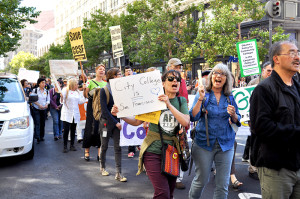
Protesters by the hundreds gathered in the streets of San Francisco, questioning California’s largest community college’s recent termination of accreditation.
“Save CCSF!” and “Stop the privatization of schools!” chanted demonstrators holding up signs, marching from the front of the downtown campus to the steps of the Department Education, located on Beale St. The group cheered on with hope that their movement will urge the Department of Education to step in.
The accreditation is at the will of the department, which is the governing branch that determines the organizations that issue accreditations for schools. Accrediting Commission for Community and Junior Colleges (ACCJC), a non-profit agency was selected as part of the Higher Education Opportunity Act in 2008, and is one of seven commissioned accrediting agencies in the western region of United States.
On Tuesday, the march to protest the ACCJC’s decision voted on last Thursday, was organized by Save CCSF, a coalition of faculty, students and administrators.
“It is like issuing a death sentence for City College of San Francisco,” said Howard Meng, a second year, full time student.
The consequences of losing accreditation means the loss of federal funding for students, loss of programs and jobs, and could potentially lead to the closing of the school.
The vote is the result of CCSF’s inability to satisfy ACCJC’s accreditation standards and requirements to change deficiencies found in 2012. According to the ACCJC evaluation report of 2012, the deficiencies were related to fiscal and financial accountability, as well as the lack of leadership.
Additionally, according to a letter dated July 2, 2012, written by the ACCJC to Dr. Pamela Fisher, the Interim Chancellor of CCSF, revealed that the school had ongoing problems since 2006. In a 2006 evaluation, ACCJC highlighted eight deficiencies, yet only five were partially addressed.
CCSF Spokesperson Jennifer Aries acknowledged that the recommendations and eligibility requirements for accreditation set forth by ACCJC were difficult to meet and were above and beyond what the current faculty, teacher and administrators could handle.
“It was a lot of work and a year is not a lot of time, but a significant amount of process was made during this past year,” she noted.
Currently, ACCJC found 14 deficiencies at the college that needed to be resolved by this year, only two issues have been satisfactorily resolved, according to the ACCJC reports.

In a statement made in a press release by the Interim Chancellor for CCSF, Fisher recognizes the need for dramatic changes, most importantly, reducing the amount spent on personnel and staff. CCSF currently spends 92 percent of its budget on personnel, making it the highest percentage of any community college in the state, only leaving 8 percent for operations.
“Reducing this number to allow funding of the other critical needs identified in the Accreditation report is central to a meaningful resolution of the College’s fiscal crisis,” Fisher stated.
The date for termination is set for July 31, 2014. The standard one-year time frame allows schools to begin the process of shutting down accredited courses and aiding students to complete their certifications and transfer degrees.
Although, Aries said they are planning to request a review of the decision and will file an appeal after it is made. The process may take months but they will continue to operate as an accredited school and accept new students.
Wendy Kaufmyn, engineering teacher of 30-years at CCSF and the Master of Ceremonies at the march, said the Department of Education could revoke ACCJC’s authority and direct them to rescind their determination to terminate accreditation.
“We are not questioning the standards themselves,” Kaufymn clarified that the 14 recommendations to change are not unreasonable but explains, “We are questioning this particular accrediting agency’s interpretations of the standards and assessment of how we met the standards.”
She also noted that ACCJC is currently under investigation by the Department of Education and that a complaint was filed on April 30 by the California Federation of Teachers and several employee unions.
The Department of Education has not made an official response.
On Monday, Brice Harris, the Chancellor of California Community Colleges, along with San Francisco Mayor Ed Lee, expressed their concern and indicate they plan to help keep CCSF in operation.
“A bold plan of action is needed to rescue City College. For this reason, I fully support the recommendation to appoint a special trustee with full authority by the Community Colleges Board of Governors to expedite reforms that are needed for the college to continue,” said Lee.
The idea of a special trustee is a skeptical resolution, according to Kaufmyn.
“This super trustee that is forced on us has total authority. He can close centers, he can fire people and can shut down programs and that’s what is going to happen, that’s what we are afraid of,” said Kaufmyn.
In the meantime, the 85,000 students of City College of San Francisco are left with uncertainty.
“It is all feeling surreal to me,” said Heidy Eseimoca, a third year student of Child Development studies at CCSF. “My goals are really going to have to shift and my future plans for my education are going to have to be re-prioritized because the fact is I cannot afford to go anywhere else.”












